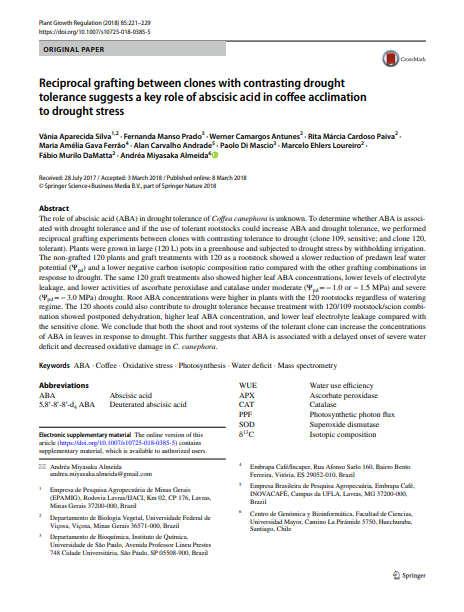Reciprocal grafting between clones with contrasting drought tolerance suggests a key role of abscisic acid in coffee acclimation to drought stress

Fecha
2018Autor
Miyasaka Almeida, Andrea [Univ Mayor, Fac Ciencias, Ctr Genom & Bioinformat, Camino Piramide 5750, Santiago, Chile]
Silva, Vania Aparecida
Prado, Fernanda Manso
Antunes, Werner Camargos
Cardoso Paiva, Rita Marcia
Gava Ferrao, María Amelia
Andrade, Alan Carvalho
Di Mascio, Paolo
Loureiro, Marcelo Ehlers
DaMatta, Fabio Murilo
Ubicación geográfica
Notas
HERRAMIENTAS
Acceda a títulos restringidos
¿Cómo descargar?Resumen
The role of abscisic acid (ABA) in drought tolerance of Coffea canephora is unknown. To determine whether ABA is associated with drought tolerance and if the use of tolerant rootstocks could increase ABA and drought tolerance, we performed reciprocal grafting experiments between clones with contrasting tolerance to drought (clone 109, sensitive; and clone 120, tolerant). Plants were grown in large (120 L) pots in a greenhouse and subjected to drought stress by withholding irrigation. The non-grafted 120 plants and graft treatments with 120 as a rootstock showed a slower reduction of predawn leaf water potential (Psi(pd)) and a lower negative carbon isotopic composition ratio compared with the other grafting combinations in response to drought. The same 120 graft treatments also showed higher leaf ABA concentrations, lower levels of electrolyte leakage, and lower activities of ascorbate peroxidase and catalase under moderate (Psi(pd) = - 1.0 or - 1.5 MPa) and severe (Psi(pd) = - 3.0 MPa) drought. Root ABA concentrations were higher in plants with the 120 rootstocks regardless of watering regime. The 120 shoots could also contribute to drought tolerance because treatment with 120/109 rootstock/scion combination showed postponed dehydration, higher leaf ABA concentration, and lower leaf electrolyte leakage compared with the sensitive clone. We conclude that both the shoot and root systems of the tolerant clone can increase the concentrations of ABA in leaves in response to drought. This further suggests that ABA is associated with a delayed onset of severe water deficit and decreased oxidative damage in C. canephora.
Coleccion/es a la/s que pertenece:
Si usted es autor(a) de este documento y NO desea que su publicación tenga acceso público en este repositorio, por favor complete el formulario aquí.